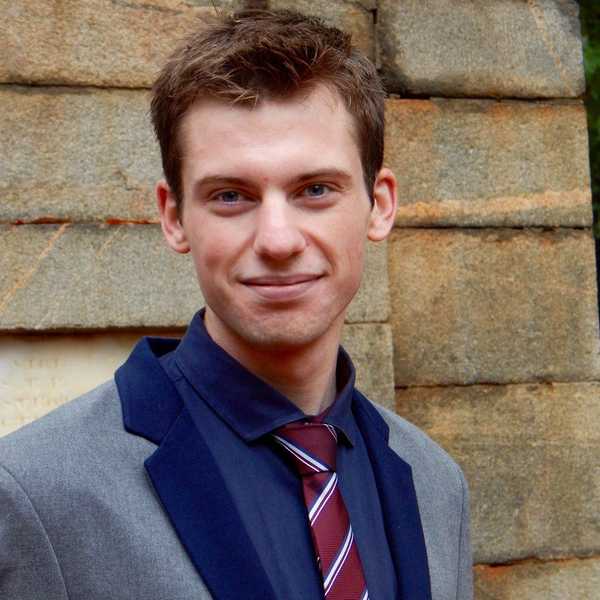As college students, I think we all feel a lot of pressure to define what we are doing with our lives. Whether it be our "purpose," our "dream job" or our "passion," we are always asked to define and prove ourselves. We feel a lot of pressure to be successful and to make a name for ourselves.
I find it so empowering when I hear of fellow students already making a difference in the community we live in. This reminds me that it is possible for us college students to find success and make a name for ourselves before graduation comes along; before we find our careers. I had the pleasure of meeting a fellow SDSU student who is doing just that.
Anthony Berteaux is the Assistant Opinion Editor for the Daily Aztec at SDSU, a Campus Editor at Large for the Huffington Post for SDSU, and an advocate for Israel. He even wrote an "Open Letter to Seinfeld" that went completely viral online. Anthony is a current junior at San Diego State majoring in journalism and minoring in Japanese. I had the pleasure of speaking to him about the success he has already found in his journalism career this early on. What I find so relatable about Anthony is he went into college not knowing that he would eventually discover something that he would become so passionate about.
Q: For someone that is only a junior, you have already accomplished A LOT, and we'll get to all that later, but first, did you always know that you wanted to be involved in journalism?
TB: Actually, no, when I got to SDSU I didn’t really care about journalism my first half of freshman year. I got truly into it during the spring semester when I started writing for the opinion section of the Daily Aztec. My second article writing for opinion ended up going viral about a sexist A.S. campaign video, and since then, I've been passionate about continuing valuable dialogue on campus through opinion journalism.
Q: As Huffington Post Campus Editor at Large, what are your daily responsibilities and duties? What made you decide to want to take this position?
TB: I've been doing it for one semester now. I recruit bloggers and writers for their blog section. It's been pretty successful. We have around 15 people at SDSU writing for the Huffington Post, and 20 people at other campuses across the U.S. (and the world), too. I occasionally pitch stories about what's happening on State's campus.
Q: What kind of opportunities has working for the Huffington Post opened up for you? What are some perks that come with the job?
TB: In May they flew all of the campus editors out for the 10-year anniversary of the Huffington Post in New York. We got to hear a bunch of speakers and editors talk to us about where they started and had a one on one chat with Arianna Huffington, which was really cool. She spoke about how she valued the voices of college students and millennials because we are the future and the ones who inspire change. She also spoke to us on the importance of taking naps as well. The biggest perk for me was being able to listen to all of the editors and their stories of how they got to Huffington Post. It was interesting to see the variety of backgrounds everyone came from. This is definitely a perk of working for the Huffington Post.
Q: When your letter to Seinfeld blew up, what was your immediate reaction? I’ve read some of the comments and they are a little harsh; people disagree with what you said to Seinfeld. How did you feel about this?
TB: It was really weird because I wrote it in the middle of the night, with no intent of it going viral, and as it got published next morning, I noticed that I had started a conversation that was beyond my control. I started getting a lot of tweets, and I have to be honest, it was really intense. Then, people started writing articles in response, like the New York Post and Washington Post. Once that happened I was like, "OK this is kind of cool that I've started a dialogue about comedy." The whole thing started rough but got a lot better.
Q: What was your reaction when Bill Maher called you a little sh*t on his show?
TB: I actually celebrated and went out that night after someone messaged me and told me that Bill Maher spoke about me. I've never cared for this opinion, so to have him come out and call me a "little sh*t" was a truly gratifying experience. Overall, it was pretty surreal to see my writing on national TV.
Q: What kind of impact do you think you have on this world as a young leader for aspiring journalists such as myself? Any advice for aspiring journalists?
TB: I spent the summer in D.C. working for a nonprofit called the Israel project. Through the fellowship, I met with many different types of journalists, all experts in different regions of the Middle East, and each with backgrounds that have taken them across . When people think about journalism they tend to only think about one path, but talking to these journalists made me see a different future for myself. I do opinion writing, and I didn’t realize there was this whole world of opinion and long-form journalism and so many different paths you can take.
I want to tell my writers that even though you are a journalism major, that doesn’t mean you can only take one path as a journalist. You know, you can be an opinion journalist or really go down any path at all, and I don't think a lot of people realize truly the amount of opportunities that are out there for students who are interested in storytelling, but don't necessarily fit into the cookie cutter journalism path. My advice to writers is to pursue topics that scare you a little bit or that you may not even know about. My sophomore year was a really intense learning experience learning about Israel and the Middle East, which was completely new to me.
Q: Tell me a bit about your role in Israeli advocacy. What does it mean to you? Tell us about what you advocate?
I’m really passionate about advocacy for Israel and promoting a peace process between Israel and Palestine. Initially, when I first started becoming interested in the topic of Israel, I bought into anti-Israel propaganda on campus. But, eventually, I realized how uninformed I was about the topic, and decided to do some research and reach out to those with connections to Israel. I was surprised by how little I knew about the topic, and I wrote an article about the Divestment campaign on campus and how I didn’t agree with the message. I went to Israel last winter break on a sponsored trip with the Anti-Defamation League and that would have never happened if my editor didn’t encourage me to pursue a topic I didn’t have knowledge in. It is upsetting when I hear misinformed facts about Israel on campus, because I have been there and spoken to Israelis and Palestinians about their complex situation. I feel that the dialogue in the states and on campus exists to back up an agenda, and I'm trying to make the dialogue more nuanced and represent the facts as they are.
Q: Where do you want to go from here; what would your dream job in journalism be?
TB: Originally, I wanted to go back to Japan, where I'm from and discuss American and Japanese relations. However now, after graduation, I see more paths for myself. I would love to be a columnist in any form among other things. I really look up to Ta-Nehisi Coates, with the Atlantic, and how he has created a career for himself in fostering dialogue about race relations in the U.S. today. I would love to be a writer in some kind of capacity where I can influence issues in a similar manner. What’s cool about the internet age is that one doesn't have to wait to get published, or obtain a job, one can create jobs for oneself. With the Internet, you can create anything if you work towards establishing a voice for yourself. People always say journalism is bad, but honestly, I feel like you just have to go in and make your own space within the industry. I just feel like journalism students especially get intimidated very easily at the prospects of employment after graduation. Honestly, I'm still in college, I'm still learning about the Middle East and Israel, and I'm still learning about myself. I don't have a dream job at the moment, but I know a few things I'm passionate about: East Asian politics, Israel, and fostering conversations about a peace process in the Middle East. If a job could touch on any of these topics, I would be satisfied. But, who knows?
If you’re interested in reading more of Anthony’s articles, check them out at the Huffington Post website and The Daily Aztec website.





















